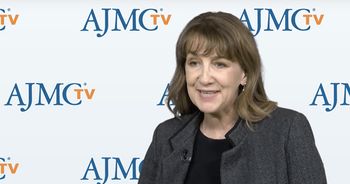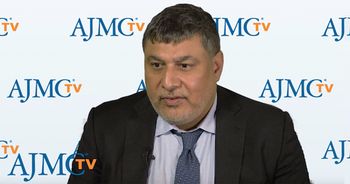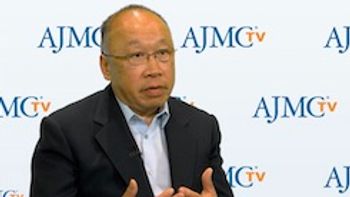
Brenda Schmidt, CEO of Solera Health, discusses how Solera has been getting ready for the launch of the Medicare Diabetes Prevention Program on April 1, 2018.

Brenda Schmidt, CEO of Solera Health, discusses how Solera has been getting ready for the launch of the Medicare Diabetes Prevention Program on April 1, 2018.

Care coordination is vital to ensure improved patient outcomes as both CMS and private payers are paying increased attention to it, pointed out Adam Brufsky, MD, PhD, co-director of the Comprehensive Breast Cancer Center at University of Pittsburgh. How is your institution infusing care coordination in its workflow?

There is a lot of energy around educating consumers about their risk for type 2 diabetes, explained Brenda Schmidt, CEO of Solera Health.

Adam M. Brufsky, MD, PhD, co-director of the Comprehensive Breast Cancer Center at University of Pittsburgh, notes important value coordinates of breast cancer care.

Technology is becoming more prevalent in practice, so it's crucial that practices choose the right technology to deliver care, said Robin Shah, vice president of Provider Marketing and Strategy at Flatiron Health.

Nat Turner, co-founder and CEO of Flatiron Health, says that clinical research accessibility is one of the biggest barriers in oncology care that Flatiron Health is working to remove.

There are a number of treatment choices available to treat patients with breast cancer and diagnostic tests can assist in the decision making, according to Adam M. Brufsky, MD, PhD, co-director of the Comprehensive Breast Cancer Center at University of Pittsburgh.

The changing payment and competition landscape in healthcare are the 2 biggest challenges facing community oncologists today, explained Robin Shah, vice president of Provider Marketing and Strategy at Flatiron Health.

Nat Turner, co-founder and CEO of Flatiron Health, explains how data can be used for finding potential patients to be included in clinical trials.

When looking at the value of a medication, pharmaceutical companies are looking at outcomes, including ones that encompass patient centricity, said Ira Klein, MD, MBA, FACP, senior director of healthcare quality strategy for the Strategic Customer Group at Janssen Pharmaceuticals.

Community oncology practices need to think outside of the box to keep up with competition and be successful, said Robin Shah, vice president of Provider Marketing and Strategy at Flatiron Health

Brenda Schmidt is CEO of Solera Health, an integrator that serves as the “back office” for both community-based and digital providers of the Diabetes Prevention Program (DPP), an evidence-based program that has been shown to reduce incidence of people with prediabetes progressing to type 2 diabetes. In April, Medicare will take the historic step of launching the DPP for beneficiaries, and Solera has been at the forefront of helping providers navigate the policy and technical hurdles to serve clients who will take part in the DPP.

Rick Doubleday is the executive vice president, and chief commercial officer at Dexcom. He is responsible for the sales, marketing and customer service functions. Previously, Doubleday led all sales and marketing functions for the company, driving the acceleration of worldwide awareness and adoption of Dexcom continuous glucose monitoring (CGM). Doubleday visited The American Journal of Managed Care® this fall to discuss bringing the Dexcom G5 to Medicare beneficiaries.

The biggest barriers to stopping the transmission of HIV are both the large population of infected people not receiving treatment and the lack of pre-exposure prophylaxis for high-risk individuals, said Thomas C. Quinn, MD, director of the Johns Hopkins Center for Global Health.

Community oncologists have a major role in accelerating treatment development and providing them to patients, said Amy Abernethy, MD, PhD, the chief medical officer, chief scientific officer, and senior vice president of oncology at Flatiron Health.

Bobby Green, MD, MSCE, senior vice president of clinical oncology at Flatiron Health, discusses analyzing patient data to improve the overall care delivery and its challenges involved with being so early in the process.

Although patients and physicians both recognize the need to discuss obesity, the lack of resources, time, and expertise often prevents physicians for offering care and patients from asking for it, explained Todd Hobbs, MD, Novo Nordisk’s vice president and chief medical officer.

Nat Turner, co-founder and CEO of Flatiron Health, discusses how oncologists use data to assist them in meeting the requirements in new payment models.

Naiyer A. Rizvi, MD, director of thoracic oncology and immunotherapeutics at Columbia University Medical Center discusses using PD-L1 expression on a tumor to identify patient response to treatment.

Community oncologists face a challenge in getting patients into clinical trials, but new technology could help them get access to those trials, explained Tesh Khullar, senior vice president of provider solutions at Flatiron Health.

Data needs to be more organized so it is more available and useful at the point of care, said Amy Abernethy, MD, PhD, the chief medical officer, chief scientific officer, and senior vice president of oncology at Flatiron Health.

Linda Schwimmer, president and CEO of the New Jersey Health Care Quality Institute, discussed the impact of data on lowering the state’s C-section rates, which are among the highest in the country.

On December 5, 2017, FDA approved Novo Nordisk’s semaglutide, a once-weekly glucagon-like peptide-1 (GLP-1) receptor agonist for the treatment of type 2 diabetes. Todd Hobbs, MD, Novo Nordisk’s vice president and chief medical officer, spoke with The American Journal of Managed Care® just ahead of FDA’s action.

Practices now should have at least 1 person who understands analytics, as their prevalence and importance grows in the field, explained Nat Turner, co-founder and CEO of Flatiron Health.

Bobby Green, MD, MSCE, senior vice president of clinical oncology at Flatiron Health discusses the future of clinical trials and how the software tool, OncoTrials, can be used to help match patients to trials.

Results from the FOURIER trial have provided convincing data that there is no downside to aggressively lowering cholesterol with PCSK9 inhibitors, and studies have shown there are cardiovascular benefits associated with Repatha, but reimbursement remains challenging, said Eliot A. Brinton, MD, FAHA, FNLA, president of the Utah Lipid Center.

Linda Schwimmer, president and CEO of the New Jersey Health Care Quality Institute, discusses the impact of the group’s report, Medicaid 2.0, which outlined how the state can bring healthcare transformation principles to a program that consumes a fifth of the state budget. New Jersey elected a new governor in November, and the blueprint was widely seen a policy recommendation for the next administration.

A non-fasting test to measure low-density lipoprotein (LDL) cholesterol has many advantages for patients and physicians, but payers can also see some benefits, explained Eliot A. Brinton, MD, FAHA, FNLA, president of the Utah Lipid Center.

Diabetes prevention is about a change in lifestyle that will lead to internalized benefits that reduce risk, explained Paul Chew, MD, chief medical officer of Omada Health.

Real-world evidence isn't usually used for regulatory decisions, but the FDA is poised to start using it more, and there are challenges to using real-world data in clinical trials that will need to be navigated, said Nat Turner, co-founder and CEO of Flatiron Health.